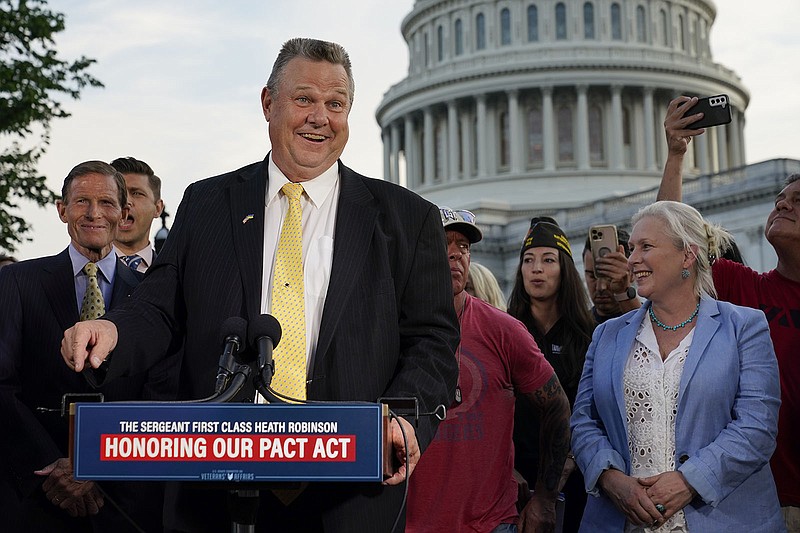WASHINGTON -- A bill enhancing health care and disability benefits for millions of veterans exposed to toxic burn pits won final approval in the Senate on Tuesday, ending a brief stalemate over the measure that had infuriated advocates and inspired some to camp outside the Capitol.
The Senate approved the bill by a vote of 86-11. It now goes to President Joe Biden's desk to be signed into law. Biden described the legislation as the biggest expansion of benefits for service-connected health issues in 30 years and the largest single bill ever to comprehensively address exposure to burn pits.
"I look forward to signing this bill, so that veterans and their families and caregivers impacted by toxic exposures finally get the benefits and comprehensive health care they earned and deserve," Biden said.
The Senate had overwhelmingly approved the legislation back in June, but a do-over was required to make a technical fix. That process derailed when Republicans made a late attempt to change another aspect of the bill last week and blocked it from advancing.
The abrupt delay angered veterans groups and advocates, including comedian Jon Stewart. It also placed GOP senators in the uncomfortable position of delaying the top legislative priority of service organizations in this session of Congress.
A group of veterans and their families have been camping out at the Capitol since that vote. They had endured thunderstorms and Washington's August humidity, but they were in the gallery as senators cast their votes.
"You can go home knowing the good and great thing you have done," Senate Majority Leader Charles Schumer, D-N.Y., told the veterans.
The legislation expands access to health care through the Department of Veterans Affairs for millions who served near burn pits. It directs the VA to presume that certain respiratory illnesses and cancers were related to burn-pit exposure, allowing veterans to obtain disability payments to compensate for their injury without having to prove the illness was a result of their service.
Roughly 70% of disability claims related to burn-pit exposure are denied by the VA due to lack of evidence, scientific data and information from the Defense Department.
The military used burn pits to dispose of such things as chemicals, cans, tires, plastics and medical and human waste.
Hundreds of thousands of Vietnam War-era veterans and survivors also stand to benefit from the legislation. The bill adds hypertension, or high blood pressure, as a presumptive disease associated with Agent Orange exposure.
The Congressional Budget Office projected that about 600,000 of 1.6 million living Vietnam veterans would be eligible for increased compensation, though only about half would have severe enough diagnoses to warrant more compensation.
Also, veterans who served in Thailand, Cambodia, Laos, Guam, American Samoa and Johnston Atoll will be presumed to have been exposed to Agent Orange. That's another 50,000 veterans and survivors of deceased veterans who would get compensation for illnesses presumed to have been caused by their exposure to the herbicide, the agency projected.
The bill is projected to increase federal deficits by about $277 billion over 10 years.
The bill has been a yearslong effort begun by veterans and their families after they had returned from the fighting in Iraq and Afghanistan and experienced maladies that they suspected were caused by their close proximity to burn pits. It was named after Sgt. 1st Class Heath Robinson from Ohio, who died in 2020 of cancer he attributed to prolonged exposure to burn pits.
Stewart also brought increased exposure to the burn-pit maladies veterans were facing. He also was in the gallery watching the vote Tuesday. He wept as the final vote began.
"I'm not sure I've ever seen a situation where people who have already given so much had to fight so hard to get so little," he said after the vote. "And I hope we learn a lesson."
An earlier version the House approved in March was expected to increase spending by more than $320 billion over 10 years, but senators trimmed some of the costs early on by phasing in certain benefit enhancements. They also added funds for staffing to help the VA keep up with the expected increase in demand for health care and in disability claims.
Some GOP senators are still concerned that the bill will increase delays because of an increased demand.
Sens. Jon Tester, D-Mont., and Jerry Moran, R-Kan., led the effort to get the bill passed in the Senate. After passage, Tester told reporters he received a call from Biden, thanking him for "taking a big weight" off his shoulder.
